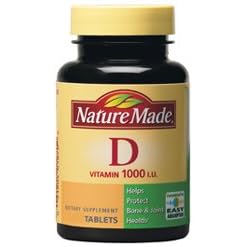What can reduce rates of cancer, diabetes, and auto-immune diseases like multiple sclerosis? If you’ve been following the news lately, you might be giving a resounding cheer for Vitamin D.
Dr. Oz, Oprah’s favorite physician, sounds off in support of this vital nutrient, though he’s not the only one to be on the Vitamin D bandwagon lately. While I knew that vitamin D played a big role in multiple sclerosis by controlling inflammation, I had no idea of its cancer-protecting role. Here’s what Dr. Oz says about vitamin D and cancer:
It cuts your risk of breast and colon cancer.
Many cells love to multiply faster than rabbits in the arugula patch. But out-of-control cell growth can lead to cancer. Enter vitamin D. It keeps a lid on the rate that cells reproduce, and it turns on your DNA spell checker, called the P53 gene. This gene checks your DNA for typos and kills cells—like cancer cells—that have errors. Experts now believe this is why women who live in sunny climates, and thus have plenty of D (your body makes it when sunlight hits your skin), are less likely to develop breast cancer. D has also been linked to lower chances of developing ovarian and lung cancers and better odds of beating colon cancer. Recent research found that colon cancer patients with the highest D levels are the most likely to survive.
 My favorite way to get vitamin D is to expose my skin to the sun (can you say “beach”?!). Sun worshippers like myself have been thwarting our body’s vitamin D production for decades since the sunscreen movement has done such a good job of convincing everyone to slather up at all times. Now, Dr. Oz tells us, we’re learning that while the sunscreen might be protecting us from melanomas it’s leaving us vulnerable for a host of other problems.
My favorite way to get vitamin D is to expose my skin to the sun (can you say “beach”?!). Sun worshippers like myself have been thwarting our body’s vitamin D production for decades since the sunscreen movement has done such a good job of convincing everyone to slather up at all times. Now, Dr. Oz tells us, we’re learning that while the sunscreen might be protecting us from melanomas it’s leaving us vulnerable for a host of other problems.
Living in a land-locked state keeps me off the sand much of the year, but I still try to get at least my arms and face exposed to the sun for at least 5 minutes at least 5 times/week, when possible. Luckily, the mile-high city where I live sees more than 300 days of brilliant sunshine each year, and even when the ground is covered with snow the sun can be shining brightly and warmly.
For those looking to supplement, be sure to choose D3 (cholecalciferol ), the active ingredient in vitamin D, and not the synthetic form of vitamin D sold more cheaply. Here are Dr. Oz’s vitamin D supplement recommendations:
Aim for 1,000 International Units (IU) daily; 1,200 IU if you’re over 60—though check your multivitamin, which probably has around 400 IU of D, so you don’t overdo. Limit your daily dose to a max of 2,000 IU.
 The sun shines its rays down on plants and plants photosynthesize, using the sun’s energy for the growth of plant cells.
The sun shines its rays down on plants and plants photosynthesize, using the sun’s energy for the growth of plant cells.
 vitamin D production
vitamin D production
